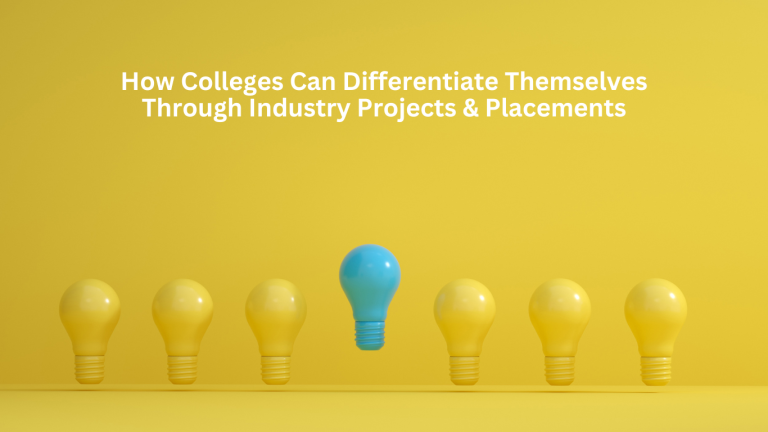Introduction
The demand for job-ready graduates is increasing, and industry projects & placements play a crucial role in bridging the employability gap. Traditional classroom learning is no longer enough to prepare students for real-world challenges. Industry projects & placements provide students with hands-on experience, helping them develop problem-solving skills and gain industry exposure. Colleges that integrate these initiatives into their academic programs enhance student employability and institutional reputation. This blog explores how industry exposure can set colleges apart and attract more students.
Why Colleges Need Industry Projects & Placements to Stand Out
The higher education landscape is evolving rapidly, with industry-aligned learning models becoming a necessity. Employers now prefer hiring graduates who possess hands-on experience rather than just academic knowledge. Industry projects & placements significantly impact student enrollment and institutional ranking metrics. Colleges that provide industry-relevant learning opportunities gain a competitive edge over those relying solely on theoretical instruction.
The Role of Industry Projects in Higher Education
1. Enhancing Practical Learning
Live industry projects allow students to apply their theoretical knowledge to real-world challenges. Exposure to industry tools and workflows prepares them for actual job roles.
2. Bridging the Skill Gap
Many academic curricula fail to keep pace with industry advancements. Industry projects expose students to emerging technologies, making them more employable.
3. Building Strong Student Portfolios
A well-documented portfolio showcasing hands-on project experience helps students stand out to recruiters. Employers value problem-solving skills demonstrated through real-world projects.
4. Collaboration with Companies
Partnering with businesses for industry projects enables colleges to offer practical learning experiences. These collaborations also help institutions stay updated with market trends.
The Importance of Strong Placement Programs
1. Boosting Employment Rates
A high placement success rate is a key factor for prospective students when choosing a college. Strong placement programs enhance an institution’s attractiveness.
2. Strengthening Industry Connections
Establishing long-term relationships with top employers allows colleges to continuously improve their placement opportunities.
3. Enhancing Alumni Networks
Successful alumni contribute back to their institutions, helping current students find better placement opportunities through mentorship and networking.
4. Improving College Rankings
Accreditations such as NAAC and NIRF consider placement performance as a key ranking factor. Colleges that excel in placements achieve better rankings and attract more students.
How Colleges Can Implement Industry Projects & Placements Effectively
1. Partnering with Industry Leaders
- Collaborate with companies to offer live projects and structured internship programs.
- Engage with recruiters to understand the latest industry demands and required skill sets.
2. Integrating Industry Projects into Curriculum
- Replace traditional academic projects with real-world case studies and industry challenges.
- Encourage interdisciplinary collaboration to equip students with diverse skills.
3. Strengthening Internship & Placement Cells
- Offer structured internship programs with clear learning objectives and industry mentors.
- Conduct skill-based training workshops to prepare students for corporate roles.
4. Leveraging Digital Platforms Like Qollabb
- Qollabb connects students with verified industry projects and paid internships.
- Colleges can use Qollabb to provide students with pre-placement exposure to real-world work environments.
The Future of Industry-Integrated Learning in Colleges
1. Remote & Hybrid Internships
With the rise of virtual work, more companies are offering hybrid and remote internship opportunities for students.
2. AI & Automation in Hiring
Recruiters are shifting towards skills-based hiring, and industry projects will play a bigger role in job assessments.
3. Growing Industry-Academia Partnerships
Colleges that align with industry requirements will gain recognition, attract better recruiters, and increase student enrollment rates.
Conclusion: Elevating Colleges Through Industry Exposure
Colleges must differentiate themselves by offering hands-on learning experiences through industry projects & placements. These initiatives improve student employability, boost institutional rankings, and strengthen industry connections. Platforms like Qollabb help colleges seamlessly integrate real-world learning into their academic framework.
Partner with Qollabb today and enhance your institution’s industry collaborations & placement success! 🚀





